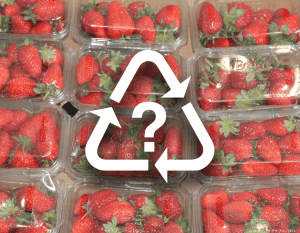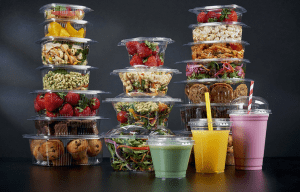In the quest for sustainability, the use of recyclable materials has become a cornerstone in various industries, including food packaging. Recycled plastic, particularly Recycled Polyethylene Terephthalate (RPET), has gained significant attention as a viable option for creating eco-friendly food containers. But is it truly safe for packaging food items like snacks, salads, fruit, and deli sides, especially in small plastic containers designed for take-out and on-the-go consumption?

RPET is derived from post-consumer PET bottles and other PET packaging waste. It offers an environmentally friendly alternative to virgin PET, reducing the demand for new plastic production and curbing waste accumulation in landfills and oceans. When recycled and processed correctly, RPET can meet the stringent safety standards required for food packaging, making it a sustainable choice for a range of applications, including snack containers, food containers to go, and take-out containers.
The safety of RPET food packaging lies in its rigorous recycling and manufacturing process. High-quality recycling facilities ensure that the recycled material is thoroughly cleaned, purified, and tested to remove contaminants, ensuring it meets the necessary food safety regulations. This process guarantees that the RPET is safe for direct food contact, preserving the taste, odor, and integrity of the packaged items, whether they are fresh salads, fruits, or deli sides.
Small plastic containers made from RPET also offer the advantage of being lightweight and durable, making them ideal for portable food packaging. They are designed to withstand the rigors of transport and handling while keeping the food fresh and secure. For businesses in the food industry, adopting RPET containers demonstrates a commitment to sustainability without compromising on food safety or quality.


Moreover, the use of RPET in food packaging aligns with the circular economy principles, promoting a closed-loop system where materials are kept in use for as long as possible. By choosing RPET food containers, consumers and businesses contribute to reducing plastic waste and carbon emissions associated with the production of virgin plastics.
In conclusion, recycled plastic, specifically RPET, is indeed safe for food packaging when processed and manufactured according to strict standards. Its application in snack containers, small plastic containers for food to go, and take-out containers presents a sustainable solution that benefits both the environment and the food industry. As consumers become more conscious of their environmental footprint, the adoption of RPET and other recyclable materials in food packaging is poised to grow, driving the transition towards a more circular and sustainable future.








